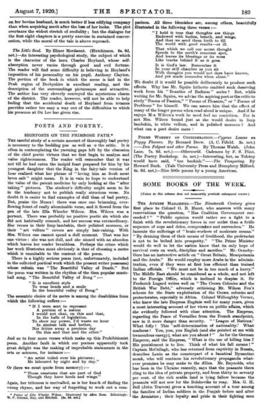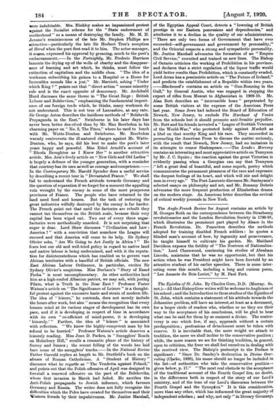SOME BOOKS OF THE WEEK.
[Notice in this column does not necessarily preclude subsequent revietvj
THE AUGUST Maw zneEs.—The Nineteenth Century gives first place to Colonel G. B. Hurst, who answers with many reservations the question, "Has Coalition Government suc- ceeded ? " "Public opinion would rather see a fight to a finish with the revolutionary forces in our midst than a futile sequence of sops and doles, compromises and surrenders." He laments the sufferings of "brain-workers of moderate means." "By draining them of their means of livelihood, the proletariat is not to be bribed into prosperity." "The Prime Minister would do well to let the nation know that its only hope of survival rests on work, discipline and sacrifice." Mr. Ormsby- Gore has an instructive article on "Great Britain, Mesopotamia and the Arabs." He would employ more Arabs in the adminis- tration, even if they were at first less efficient than trained Indian officials. "We must not be in too much of a hurry." The Middle East should be considered as a whole, and not left to the Foreign Offiee, which is inclined to despise it. Sir Frederick Lugard writes well on "The Crown Colonies and the British War Debt," adversely criticising Mr. Wilson Fox's scheme for the State exploitation of the Crown colonies and protectorates; especially in Africa. Colonel Willoughby Verner, who knew the late Empress Eugenie well for many years, gives a most interesting account of her views on public affairs, which she evidently followed with close attention. The Empress, regarding the Peace of Versailles from the French standpoint, saw in it more danger than security. "'League of Nations.' What folly ! This self-determination of nationality.' What madness ! You, you, you English (and she pointed at me with tremendous energy), what are you about?" As for the German Emperor, said the Empress, "What is the use of killing him ? His punishment is to live. Think of what his fall means ! " Captain McCullagh, who has returned from captivity in Russia, describes Lenin as the counterpart of a fanatical Byzantine monk, who will continue his revolutionary propaganda what- ever promises he may make to the Allies. Mr. Reynolds, who has been in the Ukraine recently, says that the peasants there cling to the idea of private property, and from thirty to seventy per cent, of the rich arable land is lying fallow because the peasants will not sow for the Bolsheviks to reap. Mrs. G. H. Bell (John Travers) gives a touching account of a tour among the families of Indian soldiers in the Punjab before and after the Armistice ; their loyalty and pride in their fighting men were indubitable. Mrs. Hinkley makes an impassioned protest against the Socialist scheme for the "State endowment of motherhood" as a means of destroying the family. Mr. M. H. Jerome's reminiscences of the late Mr. Stephen Phillips are attractive—particularly the late Sir Herbert Tree's reception of Herod when the poet first read it to him. The actor-manager, it seams, expressed his approval by groaning, much to the poet's embarrassment.—In the Fortnightly, Mr. Frederic Harrison laments the drying up of the wells of charity and the disappear- ance of learning and art which, he thinks, must follow the extinction of capitalism and the middle class. "The idea of a workman subscribing his guinea to a Hospital or a Home for Incurables sounds like a jest." Mr. Marriott, asking "Under which King ? " points out that "direct action" means minority rule and is the exact opposite of democracy. Mr. Archibald Hurd discusses the same theme in "The Great Siege : British Labour and Bolshevism," emphasizing the fundamental import- ance of our foreign trade which, he thinks, many workmen do not understand. This is not true of Lancashire, at any rate. Sir George Aston describes the insidious methods of "Bolshevik Propaganda in the Ft." Swinburne in his later days has never been better described than by Mr. Max Beerbohm in his charming paper on "No. 2, The Pines," where he used to lunch with Mr. Watts-Dunton and Swin.burne. Mr. Beerbohm warmly controverts the ill-natured charges against Mr. Watts- Dunton, who, he says, did his best to make the poet's later years happy and peaceful Miss Ethel Arnold's account of "Rhoda Broughton as I Knew Her" is another attractive article. Mrs. Aria's lively article on " New Girls and Old Ladies" is largely a defence of the younger generation, with a reminder that courtesy has its uses as well as courage and competence.— In the Contemporary Mr. Harold Spender does a useful service by describing a recent tour in "Devastated France." We shall fail to understand the French attitude towards Germany and the question of reparation if we forget for a. moment the appalling ruin wrought by the enemy in some of the most prosperous provinces of France. The people who have returned to the land need food and houses. But the task of restoring the great industries wilfully destroyed by the enemy is far harder. The French point out that until the factories are rebuilt they cannot tax themselves on the British scale, because their very capital has been wiped out. Two out of every three sugar- factories were methodically smashed. It is not surprising that sugar is dear. Lord Shaw discusses "Civilization and Law : America ? " with a conviction that somehow the League will succeed and that America will come to its help. Sir Sydney Olivier asks, "Are We Going to Act Justly in Africa ? " He fears lest our old and well-tried policy in regard to native land and native labour is being undermined, and with it the reputa- tion for disinterestedness which has enabled us to govern vast African territories with a handful of British officials. The new East African Labour Ordinance, in particular, excites Sir Sydney Olivier's suspicions. Miss Durham's "Story of Essad Pasha" is most uncomplimentary. As other authorities laud him as a high-souled Albanian patriot, we may ask, with jesting Pilate, what is Truth in the Near East ? Professor Foster Watson's article on "The Significance of Leisure" is a thought- ful protest against the excessive haste and strain of modern life. The idea of "leisure," he contends, does not merely include the hours after work, but also "means the recognition that every human mind at its various stages of development has its own pace, and if it is developing in respect of time in accordance with its own "co-efficient of mind-power, it is developing ' leisurely.' " Further, the idea of " leisure " is associated with reflection. "We know the highly-competent man by his refusal to be hurried." Professor Watson's article deserves a leisurely reading. Miss Joan D. Parkes, in "Smugglers' Roads on Holmbury Hill," recalls a romantic phase of the history of Surrey and Sussex ; the recent felling of the woods has laid bare some of the smugglers' tracks.—In the National Review Father Garrold replies at length to Mr. Stutfield's book on the abuses of Roman Catholicism. A "Student of History" discusses what he regards as "The Vendetta against Poland," and points out that the Polish offensive of April was designed to forestall a renewed offensive on the part of the Bolsheviks, whose firat invasion in March had failed. lie ascribes the Anti-Polish propaganda to Jewish influence, which favours Germany and Russia. The writer does not fully recognize the difficulties which the Poles have created for themselves and their Western friends by their impulsiveness. Mr. Justice Marshall, of the Egyptian Appeal Court, detects a "lowering of British prestige in our Eastern possessions and dependencies," and attributes it to a decline in the quality of our administrators. "There are only two forms of Government that have ever succeeded—self-government and government by personality," and the Oriental respects a strong and sympathetic personality. Mr. Justice Marshall advocates the formation of an "Empire Civil Service," recruited and trained on new lines. The Bishop of Ontario criticizes the working of Prohibition in his province, and declares that a strict regulation of the liquor traffic would yield better results than Prohibition, which is constantly evaded. Lord Arran has a pessimistic article on "The Future of Ireland," and predicts the establishment of a Republic within two years. —Blackwood' a contains an article on "Gun-Running in the Gulf," by General Austin, who was engaged in stopping the export of rifles from Muscat to Afghanistan in 1909-10. Mr. Alan Bott describes an "inexcusable hoax" perpetrated by some British visitors at the expense of the American Press last year. Some Jews had induced the Board of Education of Newark, New Jersey, to exclude The Merchant of Venice from the schools lest it should promote anti-Semitic prejudice. Mr. Bott and his friends invented a "League of Scottish Veterans of the World-War," who protested hotly against Macbeth as a libel on that worthy King and his race. They succeeded in persuading the American Press to discuss the matter seriously, with the result that Newark, New Jersey, had no imitators in its attempts to censor Shakespeare.—The Londo t Mercury contains an interesting and most appreciative article on Tennyson by Mr. J. C. Squire ; the reaction against the great Victorian is evidently passing when a Georgian can say that Tennyson ." left a great deal of beautiful, and some superb, poetry which communicates the permanent pleasures of the race and expresses the deepest feelings of its heart, and which will stir and delight men in every age." The Poet-Laureate discusses Mr. Santayana's selected essays on philosophy and art, and Mr. Bonamy Dobres advocates the more frequent production of Elizabethan drama on the modern stage. An American letter describes the revival of critical weekly journals in New York.



































 Previous page
Previous page